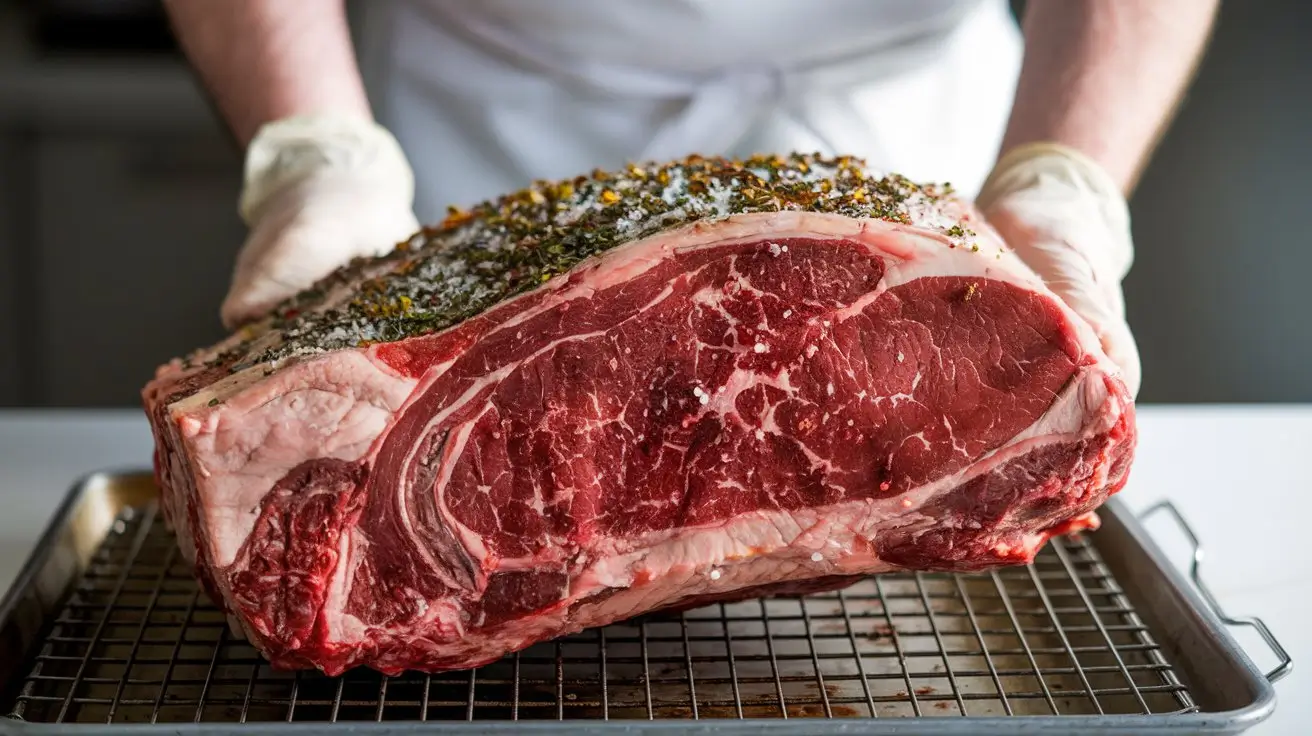Should you rub a prime rib the night before? This question has sparked countless debates among home cooks and professional chefs alike. Some swear by the overnight method, claiming it locks in flavor and tenderness, while others prefer seasoning just before cooking to avoid over-salting or drying out the meat. So, what’s the truth?
In this article, we’ll dive deep into the art and science of preparing prime rib, exploring the benefits and potential pitfalls of rubbing prime rib the night before. From understanding how salt and spices work their magic to step-by-step instructions for getting it right, we’ve got you covered. Whether you’re a seasoned chef or a holiday dinner rookie, this guide will help you make the most of your prime rib preparation.
Table of Contents
Introduction
What is Prime Rib and Why is it Special?
Prime rib, also known as a standing rib roast, is a cut of beef that’s prized for its rich flavor, marbling, and tenderness. It’s the star of holiday feasts and special occasions, often served with a crispy, herbaceous crust that’s achieved through careful seasoning and cooking. But what makes prime rib truly stand out is its ability to absorb flavors, making the seasoning process crucial to the final result.
The Role of Seasoning in Prime Rib Preparation
Seasoning isn’t just about adding salt and pepper; it’s about creating layers of flavor that complement the natural richness of the meat. A good dry rub can include garlic, rosemary, thyme, and other herbs, each playing a role in enhancing the taste. But here’s the million-dollar question: Should you rub a prime rib the night before? The answer isn’t as straightforward as you might think.
The debate over whether to season prime rib overnight hinges on a few key factors: flavor penetration, moisture retention, and texture. Some argue that letting the rub sit overnight allows the salt to draw out moisture, which then reabsorbs into the meat, creating a juicier roast. Others worry that leaving the rub on too long can lead to over-salting or drying out the surface. In the next sections, we’ll break down the science, pros, and cons to help you decide what’s best for your prime rib.
By the end of this article, you’ll have all the tools you need to make an informed decision and cook a prime rib that’s bursting with flavor and perfectly tender. So, let’s get started!
The Science Behind Rubbing Prime Rib Overnight
How Salt Penetrates Meat Overnight
When you rub a prime rib the night before, the salt in your seasoning mix starts working its magic immediately. Through a process called osmosis, salt draws moisture out of the meat, creating a brine that’s reabsorbed over time. This not only seasons the meat from the inside out but also helps break down proteins, resulting in a more tender roast.
Interestingly, this process takes time—usually 12 to 24 hours—to fully penetrate the meat. That’s why seasoning prime rib overnight is often recommended. However, it’s not just about salt; herbs and spices also infuse into the meat, creating a depth of flavor that’s hard to achieve with last-minute seasoning.
Flavor Development Over Time
Let’s face it: good things take time. When you let your prime rib sit with a dry rub overnight, the flavors have a chance to meld and intensify. Garlic, rosemary, thyme, and other spices slowly release their essential oils, which seep into the meat. This creates a more complex and satisfying flavor profile that’s worth the wait.
Moreover, the salt in the rub helps amplify the natural flavors of the beef. Think of it as a flavor booster that makes every bite more delicious. So, if you’re wondering should you rub a prime rib the night before, the answer lies in the science of flavor development.
Pros and Cons of Rubbing Prime Rib the Night Before
Advantages of Overnight Seasoning
There’s no denying that seasoning prime rib overnight has its perks. For starters, it saves you time on the day of cooking. Instead of scrambling to season the roast, you can focus on prepping sides or setting the table.
More importantly, overnight seasoning enhances both flavor and texture. The salt and spices have time to penetrate the meat, resulting in a juicier, more flavorful roast. Plus, the tenderizing effects of the rub make every bite melt-in-your-mouth delicious.
Potential Drawbacks of Rubbing Prime Rib Overnight
Of course, there are a few downsides to consider. One common concern is over-salting. If you’re heavy-handed with the salt, the meat can become too salty, especially if left overnight. To avoid this, measure your seasoning carefully and stick to a balanced recipe.
Another potential issue is surface drying. If the meat isn’t stored properly, the surface can dry out, leading to a less appealing crust. To prevent this, wrap the prime rib tightly in plastic wrap or place it in an airtight container before refrigerating.
Step-by-Step Guide to Rubbing Prime Rib the Night Before
Choosing the Right Dry Rub for Prime Rib
Before you even think about rubbing prime rib the night before, you need the perfect dry rub. A classic prime rib rub typically includes kosher salt, freshly ground black pepper, garlic powder, onion powder, and herbs like rosemary or thyme. However, feel free to get creative! Paprika, mustard powder, or even a touch of brown sugar can add depth and complexity to your rub.
The key is balance. Too much salt can overpower the meat, while too many spices can muddy the flavor. Start with a tried-and-true recipe, then tweak it to suit your taste.
How to Properly Apply the Rub
Once you’ve got your rub ready, it’s time to get hands-on. First, pat the prime rib dry with paper towels. This helps the rub stick to the surface. Next, generously coat the entire roast with the seasoning mix, making sure to cover every nook and cranny.
Don’t be shy—use your hands to press the rub into the meat. This ensures even coverage and helps the flavors penetrate deeper. If you’re worried about over-seasoning, remember that a little goes a long way, especially when you’re rubbing prime rib the night before.
Storing Prime Rib Overnight After Rubbing
After applying the rub, wrap the prime rib tightly in plastic wrap or place it in an airtight container. This prevents the surface from drying out and keeps the flavors locked in. Store it in the refrigerator, ideally on the bottom shelf where it’s coldest.
Pro tip: If you’re worried about the rub falling off, you can place the wrapped roast on a baking sheet or in a large resealable bag. This also makes it easier to handle when you’re ready to cook.
Keyword Integration: How Long to Leave Rub on Prime Rib?
So, how long should you leave the rub on prime rib? For the best results, aim for 12 to 24 hours. This gives the salt and spices enough time to work their magic without over-tenderizing the meat. If you’re short on time, even a few hours can make a difference, but overnight is ideal.
By following these steps, you’ll set yourself up for a perfectly seasoned and tender prime rib that’s sure to impress.
Alternative Methods for Seasoning Prime Rib
Seasoning Prime Rib Just Before Cooking
If you’re short on time or prefer a simpler approach, seasoning prime rib just before cooking is a viable option. While you won’t get the same depth of flavor as overnight seasoning, this method still delivers a delicious crust and juicy interior.
To do this, apply the rub about 30 minutes before cooking. Let the meat sit at room temperature to take the chill off, which helps with even cooking. This method is perfect for those who want a quick yet flavorful result.
Using a Wet Brine Instead of a Dry Rub
Another alternative is wet brining, which involves soaking the prime rib in a saltwater solution. This method is great for ensuring even seasoning and moisture retention. However, it requires more time and space than a dry rub, and it can dilute the beefy flavor if not done correctly.
If you’re curious about wet brining, check out our detailed guide on how to brine a prime rib for step-by-step instructions.
Keyword Integration: Should You Season a Roast Overnight?
So, should you season a roast overnight? While overnight seasoning is ideal for maximum flavor and tenderness, it’s not the only way to go. Whether you choose to season just before cooking or try wet brining, the key is to use high-quality ingredients and follow best practices.
For more delicious recipes and cooking tips, explore our collection of holiday roast recipes.
Common Mistakes to Avoid When Rubbing Prime Rib
Over-Salting the Meat
One of the most common mistakes when rubbing prime rib the night before is using too much salt. While salt is essential for flavor and tenderness, overdoing it can make the meat unbearably salty. To avoid this, measure your salt carefully and stick to a balanced recipe. A good rule of thumb is about 1 teaspoon of kosher salt per pound of meat.
If you accidentally over-salt, don’t panic. Rinse the roast under cold water to remove excess salt, then pat it dry and reapply a lighter layer of seasoning.
Inadequate Refrigeration Practices
Another pitfall is improper storage. If you’re seasoning prime rib overnight, it’s crucial to refrigerate it properly. Leaving the roast uncovered or at room temperature can lead to bacterial growth and spoilage. Always wrap the meat tightly in plastic wrap or place it in an airtight container before refrigerating.
Additionally, store the prime rib on the bottom shelf of your fridge, where it’s coldest. This not only keeps it safe but also helps the flavors develop evenly.
Uneven Application of the Rub
Finally, uneven seasoning can result in inconsistent flavor. When applying the rub, make sure to cover every inch of the meat, including the sides and ends. Use your hands to press the seasoning into the surface, ensuring it adheres well.
If you’re worried about missing spots, try using a small sieve or shaker to distribute the rub more evenly. This simple trick can make a big difference in the final result.
FAQs
Should I Season Prime Rib the Night Before?
Absolutely! Seasoning prime rib overnight allows the salt and spices to penetrate the meat, enhancing both flavor and tenderness. Just be sure to measure your seasoning carefully and store the roast properly to avoid over-salting or drying out the surface.
How Long to Leave Rub on Prime Rib?
For the best results, leave the rub on for 12 to 24 hours. This gives the salt enough time to draw out moisture and reabsorb it, creating a juicier, more flavorful roast. If you’re short on time, even a few hours can make a difference, but overnight is ideal.
Should You Season a Roast Overnight?
It depends on the cut and your preferences. For prime rib, overnight seasoning is highly recommended because of its thickness and marbling. However, for smaller or leaner cuts, you might prefer seasoning just before cooking.
Why Do You Salt a Prime Rib Overnight?
Salting prime rib overnight serves three main purposes: it enhances flavor, improves moisture retention, and tenderizes the meat. The salt draws out moisture, which then reabsorbs into the meat, creating a juicier and more flavorful roast.

